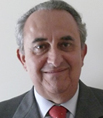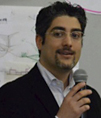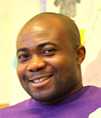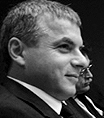Actors
Speakers Session I

• Giorgio Prister (Major Cities of Europe)
is President of Major Cities of Europe since 2008 (www.majorcities.eu) . His mission is to ensure the continuous improvement of the value proposition and the reputation of this non profit organization of Cities by promoting the exchange of experiences about innovation in Cites driven by Information and Communication Technologies (ICT).
Before he has worked for 32 years for IBM in which he covered multiple professional and managerial positions in manufacturing, sales, marketing, market strategies and finance. In the last 10 years he has been leading sales and marketing for Europe’s IBM Local Government Industry. In that role he has been driving the European IBM organization into promoting innovation and ICT in the transformation of Public Administration.
Born in Rome, Giorgio Prister is graduated in Electronics Engineering.

• Francesco Niglia (Studio Francesco Niglia – International Networking)
is Research Chair of a private ICT R&D Lab; he worked more than 10 years as consultant for Technology Transfer and holds focus expertise in the ICT for government solutions domain applied to the analysis of the sustainability and socio-economic impact of the innovation. He is responsible for the development and validation of eGovernment indicators for measuring the application of User Centricity methodology in services to citizens. He provides technical support for technology intelligence and activities to develop new technologies and innovative solutions as well as supports the development of studies focused on the implementation of good practices. He is also member of the European Skills/Competences, qualification and Occupation Board and delivered two European Standards for the CEN – European Committee for Standardization.

• Grazia Concilio (Dipartimento di Architettura e Studi Urbani, Politecnico di Milano)
ha conseguito il dottorato di ricerca presso l'Università di Napoli, è docente di Urbanistica presso il DiAP. Ha svolto attività di ricerca presso RWTH Aachen (D), IIASA in Laxenburg (A) e presso la Concordia University di Montreal, Canada. Partecipa a diversi progetti di ricerca, è responsabile di un programma CNR, coordina un progetto nazionale mirato allo sviluppo di una piattaforma di e-governance per la gestione di musei e parchi; è responsabile per il Politecnico di Milano del progetto Periphèria.

• Stefania Sabatino (SiTI - Torino & DIST - Politecnico di Torino)
PhD in Appraisal and Real Estate Valuations, is currently a fellowship researcher at the Polytechnic of Turin (DIST Department: regional and urban planning studies) as well as at SiTI – Higher Institute on Territorial Systems for Innovation (Turin). Her professional experience focuses on real estate appraisal, management and valorisation of private and public real estate assets, urban competitiveness (in particular: J.e.s.s.i.c.a. European revolving funds) and analyses oriented to contrast housing unaffordability.

• Giuseppe Roccasalva (LAQ-Tip - DAD Politecnico di Torino)
is Architect and from 2003 Research Fellow at the School of Architecture and Urban Planning of Polytechnic of Turin. He has got international training and professional experiences in urban design and spatial planning (C.T.H and K.T.H of Sweden). He has received award from European educational bodies and has published articles on design decision support systems and scenario making processes. He is an expert in urban morphological analyses ranging from GIS-based analysis to sustainable community based design. He is consultant for architectural offices, private companies and public authorities. Since 2008 he is president of local landscape and environmental committees in the area of Turin.

• Carlo De Sanctis (Puglia@Service, DHITECH Scarl, Lecce)
laureato in Ingegneria biomedica. Ha conseguito un Master di II livello in Innovazione ICT e Cloud Computing presso Telecom Italia, attualmente borsista collegato al progetto di ricerca industriale PON Puglia@Service. Entrambe le esperienze hanno consentito di accrescere conoscenze in ambito di ICT applicate alle PA.

• Anna Catalano (Associazione Culturale Metropolis Europa)
Presidente dell'Associazione Culturale Metropolis Europa. Regista, coreografa, danzaterapeuta, docente della formazione. Attraverso esperienze a livello nazionale ed internazionale (Stati Uniti), ha elaborato una specifica metodologia di lavoro applicata in ambito artistico, terapeutico e socio-culturale. Responsabile per Roma Capitale Municipio IV del Progetto Alma Welfare Community, una sperimentazione di welfare come progetto a sistema, esperienza del fare comunità attraverso la costruzione e la promozione di percorsi di inclusione a sostegno del diritto di cittadinanza sociale.

• Gospel Onyema Oparaoch (University of Eastern Finland, Joensuu)
is a doctoral student in Computer Science within the IMPDET-LE (International Multidisciplinary PhD Studies in Educational Technology & Learning Environments) program at the University of Eastern Finland. His research interest focuses on “open-innovation platforms, inter-firm networks and co-creation among small-to-medium size ICT firms”; and how industrial districts and industrial clusters can be organized as smart communities of co-creators.
Speakers Session II

• Silvia Bordin (TrentoRise, Povo, Trento)
graduated with honours in Computer Science at the University of Trento, joined the Smart Campus project as an interaction designer, also following a large long-term user evaluation and coordinating end users joining the design and development stages. She is now about to start a PhD on smart cities.

• Vincenzo Baraniello (ISIM_garage, University of Rome Tor Vergata)
business engineering (MBE) and majoring in Communication Theory (Master) and Science of Media and Communication (Bachelor). He worked at the Ministry of Defence as expert data analyst. Since 1998 he works at the computer center of Tor Vergata as a software developer and expert in databases, operating systems, mediated communication, accessibility and usability of e-learning. Since 2005 he teaches 'Databases and web based services' and 'Web media communication' for bachelor students.He is currently working with a particular focus on the changes caused by on-line media management and leadership in production environments and on improving the creative process of generating new ideas.

• Stefano Passiatore (Linea Comune Spa, Firenze)
da sempre appassionato di tecnologia e soluzioni innovative. Dopo una breve esperienza come programmatore in una piccola realtà fiorentina, lavoro da molti anni presso Linea Comune Spa che si occupa di gestire il Centro Servizi per molti Enti dell'area fiorentina. Mi occupo di database e di tecnologie Web con particolare attenzione allo sviluppo lato client. Da qualche anno mi sono interessato al mondo 'mobile' sviluppando con framework cross-platform.

• Antonio Opromolla (ISIA Roma Design)
Graduated in “Publishing and Multimedia Communication” at the University of Rome “Sapienza”. He has collaborated with RFID Lab of CATTID (Centre for the Applications of Television and for Distance Learning Techniques) of “Sapienza”, focusing on user experience about Mobile Payment services, Internet of Things and Anti-counterfeiting, on design of NFC (Near Field Communication) mobile applications and on usability studies. In 2013 he collaborated with CORIS –Department of Communication and Social Research of “Sapienza”. Since 2013, he is a PhD student in 'Interaction Design' at ISIA Roma Design, and he is doing a thesis on Smart Territories analysis and design.
Speakers Session III

• Claudio Di Carlo (Dipartimento per le Comunicazioni, MISE)
laureato in Scienze Statistiche ed Economiche e specializzato in Ricerca Operativa e Strategie Decisionali presso l’Università di Roma La Sapienza, ha pubblicato diversi articoli sull’Information and Communication Tecnology ed è membro del Focus Group 'Smart Sustainable Cities' dell'ITU (International Telecommunication Union) e del gruppo di esperti “Benchmarking adoption and use of ICTs in the health sector” dell’OCSE. Attualmente è Funzionario Statistico presso il Dipartimento per le Comunicazioni del Ministero dello Sviluppo Economico, dove svolge attività di studio e ricerca in materia di ICT.

• Carlo Giovannella (ISIM_garage, STF Dept. University of Rome Tor Vergata & Creative Industries at Consorzio Roma Ricerche)
Graduated in Physics, he worked long time in solid state physics as an expert of complex systems. Nowadays can be considered a 'Designer for the experience': expert in the technology-enhanced learning, interaction design, computer-mediated communication, design and management of processes, process and product innovation.
Since 2013 is the Scientific Director of the Creative Industries Area at the Consorzio Roma Ricerche and senior member of IEEE.
Since 2000 is chair of the ISIM_garage (Interfaces and Multimodal Interactive Systems) at the Educational Science and Technology of the University of Rome Tor Vergata where is the designer and leader of projects devoted to the development of community based integrated environment like LIFE and weTourist. He is also the trustee of the MIFAV (Museo dell'Immagine Fotografica e delle Arti Visuali) of the University.
As physicist he has edited 5 books and published more than 80 papers. He published also 20 papers as expert of photography and communication. As 'Designer for the experience' - in the domains of Technology Enhanced Learning and Interaction Design - he acted as guest editor for 8 special journal issues or volumes and published more than 80 papers. He scientific editor of the journal IxD&A.

• Valerio Moretto (Puglia@Service, DHITECH Scarl, Lecce)
laureato in Ingegneria Gestionale con tesi riguardante l’uso dell’Intelligenza Artificiale in Apparati Complessi. Project manager nel contratto di rete tra farmacie Farm@net (tra i primi in Italia). Attualmente svolge il progetto Puglia@Service nel campo dell’imprenditorialità innovativa finalizzato alla realizzazione di Puglia Smart Lab.

• Kevin Hamilton (Center for People and Infrastructures, University of Illinois)
co-directs the Center for People and Infrastructures in the Coordinated Science Laboratory at the University of Illinois, Urbana-Champaign. The Center researches the human dimensions of large-scale technical and civic systems, with an emphasis on visualization as a mode of research and public engagement. Kevin's own background lies in digital media and public design, including recent projects on multimedia annotation and navigation of archives from the history of science, technology, and national policy. At Illinois he shares appointments in the School of Art and Design, the College of Media, the Center for Advanced Study, and the Illinois Program for Research in the Humanities. He also serves as a Dean's Fellow for Research in the College of Fine and Applied Arts.

• Paolo Campigli (Linea Comune Spa, Firenze)
Dopo la laurea in Ingegneria Elettronica, conseguita con tesi sul riconoscimento ottico dei caratteri presso IBM Italia, ha lavorato presso ENEL Spa, occupandosi di organizzazione aziendale.
Dal 1998 al 2008 ha operato in qualità di funzionario presso il Comune di Sesto Fiorentino (provincia di Firenze, 48.000 abitanti) come Analista di Organizzazione e successivamente come Responsabile dei Sistemi Informativi.
E' attualmente dipendente di Linea Comune Spa (società in-house delle amministrazioni dell'area fiorentina) dove si occupa di progettazione ed implementazione di servizi on line ai cittadini.
Other authors (alphabetic order)
• Giulia Antonucci (Puglia@Service, DHITECH Scarl, Lecce)
laureata in Management Aziendale. Ha lavorato per un’azienda di ICT per aziende e PA presso Londra, ha collaborato con un gruppo di ricerca di Ingegneria dell’Innovazione dell’Università del Salento nell’ambito delle tecnologie digitali per la scuola. Attualmente impegnata nel progetto Puglia@Service per lo studio dei nuovi modelli di business che orbitano attorno all’ICT e alla creazione del Living Lab “Puglia Smart Lab”.
• Mario Barile (Puglia@Service, DHITECH Scarl, Lecce)
laureato in Scienze della Comunicazione e specializzato in Marketing, ha frequentato un corso di formazione sul software open source per l’e-commerce ed ha collaborato come “Dialogatore” con L’Alto Commissariato ONU per i Rifugiati. Attualmente svolge il progetto Puglia@Service nel campo dell’imprenditorialità innovativa finalizzato alla realizzazione di Puglia Smart Lab.
• Liliana Bazzanella (LAQ-Tip - DAD Politecnico di Torino)
is professor in design technical culture and head of the Department of Architectural and Industrial Design at Polytechnic of Turin. She has been scientific coordinator of research programs nationwide and as partner in European projects. She has been a member of the High Survey Committee financed by FIO and project manager for the expansion of the campus. She has worked often for Public Authorities on a cross disciplinary base, from redevelopment of peripheries to former industrial sites, from urban sprawl analyses to infrastructures as landscape tools. During the last ten years she worked both with architects and urban planners but also with sociologists, transport planners on the base of European and national programs or educational programs.
• Valentina Biondi (Puglia@Service, DHITECH Scarl, Lecce)
laureata in Management Aziendale con tesi sulla gestione dei rifiuti in chiave innovativa e tecnologica. Appassionata di Innovazione e tecnologia. Attualmente borsista del Progetto Puglia@Service (Dhitech Scarl) avente come obiettivo la formazione di esperti dell’innovazione ed impegnata nella creazione del Living Lab “PugliaSmartLab”.
• Letizia Cardines (Associazione Culturale Metropolis Europa)
Coreografa, danzaterapeuta, docente della formazione, collabora con l'Associazione Culturale Metropolis Europa alla ideazione e alla realizzazione di progetti educativo socio-culturali; in particolare dal 2008 è impegnata nel Progetto Alma Welfare Community, una sperimentazione di welfare come progetto a sistema, esperienza del fare comunità attraverso la costruzione e la promozione di percorsi di inclusione a sostegno del diritto di cittadinanza sociale.
• Umberto Cataldo (Puglia@Service, DHITECH Scarl, Lecce)
Laureato in Economia e Gestione delle Risorse Turistiche e Culturali, attualmente Borsista Dhitech per il progetto Puglia@Service. Da anni è impegnato in progetti di educazione ambientale promuovendo processi di inclusione e interazione sociale.
• Bruno Centrone (Puglia@Service, DHITECH Scarl, Lecce)
laureato in Ingegneria delle Telecomunicazioni, con esperienze in progettazione software e tematiche ICT. Attualmente borsista per il progetto Puglia@Service presso Dhitech scarl come Ingegnere dell’Innovazione, con l’obiettivo di creare un territorio intelligente attraverso l’imprenditoria innovativa. Esperto in Smart city e Living Labs. Membro di Puglia Smart Lab, Living Lab iscritto alla rete europea dei Living Lab (ENoLL).
• Cristina Core (TrentoRise, Povo, Trento)
Master in Product Design at ISIA Firenze, Cristina came to Trento and joined Smart Campus project one year ago; she takes care of the communication and graphic design aspects of the project. She also had an internship experience in VEGA, Venezia scientific park, where she studied luminescent materials.
• Mihai Dascalu (University Politehnica of Bucharest)
was head of promotion 2009, University Politehnica of Bucharest, and currently holds 2 master degrees - one in Internet systems engineering, UPB, and one in knowledge extraction, University of Nantes - and a double PhD in computer science (University Politehnica of Bucharest, Romania) and educational sciences (University Grenoble Alpes, France). He has experience in national and international projects (FP7 LTfLL, FP7 ERRIC and CNCSIS K-TEAMS) with more than 50 published papers, including top computer education conferences (AIED, ITS, CSCL) and other renowned international conferences (ICALT, EC-TEL, ICWL, ISPDC, AIMSA). Complementary to his competencies in natural language processing, technology-enhanced learning and discourse analysis, Mihai holds a multitude of professional certifications (e.g. PMP, RMP- PMI, CBAP, CEH, CISSP).
• Antonella de Angeli (DISI, University of Trento)
Associate Professor in Human-Computer Interaction at the University of Trento. Her research investigates cognitive, social and cultural aspects of information technologies with an emphasis on the application of this knowledge to interaction design. Antonella holds a PhD in Experimental Psychology from the University of Trieste where she also completed a 2-year post-doctoral research in Applied Cognitive Psychology. During her doctoral and postdoctoral studies she was invited to do research at the Oregon Graduate Institute (Portland, USA), Loria (Nancy, France) and IRST (Trento, Italy). From 2000 to 2004 she worked as a senior HCI researcher for the Advanced Technology and Research group of NCR (UK). Then she joined the School of Informatics of the University of Manchester as a lecturer and in 2007 was promoted to Senior Lecturer in HCI at the Manchester Business School. She has published over 100 papers, serves in the editorial board of major HCI journals and regularly sits in the program committee of leading conferences.
• Nicolò de Uffici (DISI, University of Trento)
works in Smart Campus Project as Community Designer. He has a sociological background focused on qualitative methods of analysis. In his previous job experiences, he worked for Fondazione as a Netnographer (Social Researcher) and as an Interaction Designer. In 2012, he won the national prize supported by AICA (Associazione Italiana Calcolo Automatico) and Rotary for his dissertation on web reputation. His passions are technology, social media and design.
• Fabiana De Santis (Puglia@Service, DHITECH Scarl, Lecce)
ingegnere gestionale da sempre interessata a tematiche di ICT, Open Innovation e Smart Community. Ha partecipato alla realizzazione di progetti di ricerca applicata e trasferimento tecnologico per reti di imprese e all’affiancamento operativo nella scrittura di progetti Nazionali ed Europei. Attualmente impegnata nel progetto Puglia@Service (Dhitech Scarl) finalizzato alla realizzazione del Living Lab: Puglia Smart Lab.
• Alessandro Deserti (Dipartimento di Architettura e Studi Urbani, Politecnico di Milano)
is full Professor of Industrial Design in Politecnico di Milano. His research is mainly focalized on the approaches, processes, practices and tools for the development and management of design and creativity driven innovation. In the frame of this research he investigated the new roles of design within companies, institutions and social environments, publishing several books, essays, articles. His is co-founder of the ADD (Advanced Design) research group, where his work is mainly dealing with the application to SMEs of the tools and processes for design and creativity driven innovation. He has worked on applied research and consultancy for many companies and institutions, including: Shenzhen Design Institute, China; Chengdu Design Institute, China; Regione Lombardia, Italy; SENAI, Brazil. He is currently responsible for the department of DESIGN of two European Projects: Smart Campus and My Neighbourhood | My City.
• Emanuela Gasca (SiTI - Torino & DIST - Politecnico di Torino)
Restoration Architect, Second Master Level Degree on Cultural and Environmental Heritage Management at Politecnico di Torino.
She is specialized on cultural heritage development and she recently got the PhD on Economic Valuations and Real Estate Appraisal at Politecnico di Torino.
Since 2007 she has been researcher at SiTI where she’s working as PostDoc researcher. She deals with territorial development, tourism and cultural heritage management, benchmarking analysis and economic evaluation of consumer behavior. She have been worked for some years on the research group on smart city related with community engagement and participation, innovation and governance.
• Andrea Ingrosso (CORIS Department – Sapienza University of Rome)
PhD in Computer Science at University of Milano-Bicocca, temporary research fellow at CORIS – Department of Communication and Social Research of University of Rome 'Sapienza'. His principle research activities are Smart City, Open Data, Semantic Web. He has collaborated with RFID Lab of CATTID (Centre for the Applications of Television and for Distance Learning Techniques) of “Sapienza” focusing on Location Based Technologies and Services, RFID and was involved in several research project.
• Karrie Karahalios (Center for People and Infrastructures, University of Illinois)
is Associate Professor of Computer Science at the University of Illinois at Urbana-Champaign. Karahalios completed a S.B. in electrical engineering, an M.Eng. in electrical engineering and computer science, and an S.M. and Ph.D in media arts and science at MIT. Her work focuses on the interaction between people and the social cues they perceive in networked electronic spaces. She received the Alfred P. Sloan Research Fellowship, the Faculty Early-Career Development Award from the US National Science Foundation in the area of human-centered computing.
• Raman Kazhamiakin (FBK, Povo, Trento)
is the CTO of the SmartCampus project, leading the development activities of the SmartCampus platform and services. He is also a researcher at the Service Oriented Application Research Unit at FBK. His interests include Service-oriented architectures, Cloud computing, and Platform-as-a-Service, as well as their applications to the Smart City paradigm.
• Patrizia Lecci (Puglia@Service, DHITECH Scarl, Lecce)
Phd in Public administration, ha una formazione economica e conduce da anni studi e ricerche nel campo del public management. Ha all’attivo diverse pubblicazioni sulle tematiche dello sviluppo territoriale legato agli enti locali. Attualmente impegnata nel progetto Puglia@Service (Dhitech Scarl) nel campo dell’imprenditorialità innovativa, con l’obiettivo di creare un territorio intelligente.
• Cedric Langbort (Center for People and Infrastructures, University of Illinois)
is Assistant Professor in the Department of Aerospace Engineering and in the Decision and Control Group at the Coordinated Science Laboratory, University of Illinois at Urbana-Champaign. His research focuses on distributed decision and control theory and its application to large-scale public infrastructures. He received the Faculty Early-Career Development Award from the US National Science Foundation in the area of game theoretic approaches to cyber-security.
• Maria Cristina Longo (SiTI - Torino)
graduated in International Relations and Diplomacy, has Master Degrees such as Urban Planning and Local development in Developing Countries; International Tourism and Management of Local resources; Economy and Management of Cultural Sector. Expert of international cooperation and local development, has a huge experience in consultancy on european project design (funding, eu grants and tenders) and in participatory approaches. In 2012 she has started a sound collaboration with SiTI’s International Cooperation Sector.
• Rosaria Lovecchio (Puglia@Service, DHITECH Scarl, Lecce)
laureata in Amministrazione e Controllo di Gestione, Dottore commercialista e Dottoranda di ricerca in Economia Aziendale su tematiche riguardanti le aggregazioni aziendali, in particolare reti di impresa e collaborazioni pubblico-privato. Attualmente borsista Dhitech sul progetto Puglia@Service.
• Ilaria Mancini (Associazione Culturale Metropolis Europa)
Dottore di ricerca in Psicologia dell’Interazione, della Comunicazione e della Socializzazione presso Sapienza-Università di Roma (con particolare interesse di ricerca circa l’uso delle Nuove Tecnologie in contesti di costruzione di comunità di pratiche), dal 2008 collabora con l’Associazione Culturale Metropolis Europa nel Progetto Alma Welfare Community, una sperimentazione di welfare come progetto a sistema, esperienza del fare comunità attraverso la costruzione e la promozione di percorsi di inclusione a sostegno del diritto di cittadinanza sociale.
• Giuseppe Mantero (Linea Comune Spa, Firenze)
Laureato in matematica all’università di Genova ha operato per più vent’anni, in ruoli di crescenti responsabilità in Italia ed Europa per società leader nel settore ICT. Tra l’altro è stato direttore operativo del Centro Nazionale di marketing diretto DECdirect, direttore EMEA per il supporto ai Partners di Digital e Compaq ed amministratore delegato di IBS Italia. Come responsabile del progetto eFirenze ha gestito la creazione e lo sviluppo del Centro Servizi Territoriale fiorentino e partecipato alla creazione di Linea Comune. Linea Comune è la società degli Enti Locali del territorio Fiorentino che permette a Comuni e Provincia di offrire servizi evoluti a Cittadini , Professionisti ed imprese.
• Carlo Maria Medaglia (DIAG – Sapienza University of Rome)
responsible of Human Computer Interaction at Mass Communication Department of University of Rome “La Sapienza” and strategic ICT consultant for several public and private companies. His principle research activities are internet of things, mobile/wireless communication, interaction design and ITS. He is member of the “Cabina di regia sul RFID” of the Italian Governament, of the “Commissione interministeriale” on software accessibility and of the “Commissione Interministeriale” on Innovation in Turism. He is also member of several working group of the European Commission on RFID, Internet of Things, e-inclusion and ICT for trasportation and mobility.
• Fabrizia Moggio (ISIM_garage, STF Dept. University of Rome Tor Vergata)
obtained is Bachelor in Industrial Design and Master in Product Design at the 'La Sapienza' University in Rome. In 2007 she took part in the 'Lissone Design' competition resulting in the top 10 with a project for children. In the same year she took part in the 'Ikea' workshop organized by 'La Sapienza' University. In 2009 she got a special award for her participation in the 'Designer School UNICAM 2009'. At present she is involved in a 'Design for the experience' project focused on 'services for touristic experience' at the ISIM_garage of the 'Tor Vergata', University in Rome.
• Sylvie Noël (DISI, University of Trento)
Ph.D., she is a research officer at the University of Trento where she is presently working on the Smart Campus project. She has previously worked for the government of Canada and the University of Western Australia on such issues as computer-supported learning, computer-supported collaborative editing, collaborative virtual worlds, and security and trust in a mobile environment.
• Mauro Palatucci (ISIA Roma Design)
Coordinator and scientific director of PHD in Interaction Design, ISIA ROMA DESIGN, Italy; Professor of ‘Interaction Design’ and ‘Multimedia Design’, ISIA ROMA DESIGN, Italy; Member of Academic Council Board, ISIA ROMA DESIGN, Italy; Professor of ‘Multimedia Design’, Academy of Fine Art - Media Art , Frosinone, Italy; Professional designer and consultant. Research interests: actually he is researching in automatic and cognitive controlled processes in Interaction Design, behavioural experiences as wireframing tools to design new paths in product design (keywords: Interaction Design, Digital Dialectic, Physical Computing, Human Factors in Computing Systems, Systems Design, Design Methods, Taxonomies, Experience Design).
• Daniele Papadia (Puglia@Service, DHITECH Scarl, Lecce) • Andrea Patriarca (ISIM_garage, STF Dept. University of Rome Tor Vergata) • Marco Pistore (FBK, Povo, Trento) • Miko Rajala (University of Joensuu) earned PhD in Industrial Economics from Aalto University and he has over 25 years business experience from major industrial companies, including manufacturing and logistics, strategy and business transition management, ICT technologies and quality improvement. His current main interests are focused to human centered business models, architectures and collaborative networks as well as transformational strategies and methodologies related to human learning and change. • Francesca Rizzo (Dipartimento di Design, Politecnico di Milano) • Maria Grazia Rodano (Puglia@Service, DHITECH Scarl, Lecce) • Tecla Romano (Puglia@Service, DHITECH Scarl, Lecce) • Maria Grazie Rosa (Puglia@Service, DHITECH Scarl, Lecce) • Christian Sandvig (School of Information, University of Michigan) • Federico Scaccia (ISIM_garage, STF Dept. University of Rome Tor Vergata) • Laura Schina (KoySLab) is consultant at the CCII University of Salento providing functional support for the activities related to the design and implementation of innovative services as well as supports the development of studies focused on the implementation of good practices oriented to enabling the user centric approach within the Public Entities. She has been involved in activities related to the thematic networks in the eGovernment domain and analysis of the impact of user-centricity. • Francesco Simone (Puglia@Service, DHITECH Scarl, Lecce) • Calkin Suero Montero (University of Joensuu) is a Human Computer Interaction expert that has extensive experience working within international environments in the fields of computational linguistic, novel interaction techniques usability and sentiment analysis. Her main research interests include interdisciplinary research between HCI and Human Language Technologies (HLT) applications such as conversational system; designing and implementing algorithms for text-based Affective Computing; investigating the social acceptance of novel human-computer interactions, such as gesture-based mobile interactions designs; and computer supported collaborative work in educational settings • Erkki Sutinen (University of Joensuu) • Simona Valenti (LAQ-Tip - DAD & Facoltà di Architettura, Politecnico di Torino) • Valentina Volpi (ISIA Roma Design) • Gabriele Zacco (FBK, Povo, Trento)
Ingegnere delle Telecomunicazioni, ha lavorato nell’ambito della progettazione di dispositivi microelettronici. Possiede l’abilitazione certificata presso il Ministero delle Comunicazioni come Radioamatore. Attualmente svolge il progetto Puglia@Service nel campo dell’Imprenditorialità Innovativa finalizzato alla realizzazione di Puglia Smart Lab.
Student at the University of Rome Tor Vergata (degree in Media Science and Communication). He is currently working on his thesis on integrated web and mobile applications for small smart communities.
is research director at Fondazione Bruno Kessler, where he heads the Service Oriented Applications research unit. He is also responsible of the Smart Campus project and of other research and innovation projects in the fields of smart cities and communities and of distributed systems and services.
is a researcher at Politecnico di Milano, Department of Industrial Design. PhD in Telematics and Information society at University of Siena. She taught Human Computer Interaction and Interaction Design at University of Siena and at Politecnico of Milan. Fields of interest: User Centred Design (UCD), user studies and usability of interactive products. She is author of many articles and worked in different European Research Projects and coordinates, for INDACO, Peripheria and Life 2.0 projects.
laurea in Ingegneria dell'Informazione, ha lavorato per una nota società di consulenza informatica nell'ambito IT/Telco. Dopo aver maturato un esperienza anche in ambito internazionale decide di puntare al sud dedicandosi all'innovazione della sua città natale. Attualmente è parte attiva del progetto Puglia@Service improntato alla realizzazione di servizi internet based per una smart city.
laureata in Ingegneria Gestionale, con uno spiccato interesse per l’innovazione e le tematiche ambientali. Attualmente impegnata nel progetto Puglia@Service (Dhitech Scarl), incentrato sullo sviluppo di servizi internet based per lo sviluppo strutturale di un territorio intelligente.
laureata in Management Aziendale, attualmente lavora al progetto Puglia Smart Lab del distretto tecnologico DhiTech scarl. Da anni è impegnata nella ricerca di modelli economico-ambientali sostenibili.
is based at the University of Michigan, where he is an Associate Professor of Information in the School of Information. He is also a Faculty Associate of the Berkman Center for Internet & Society at Harvard University. Christian received the Ph.D. in Communication from Stanford University and previously served as Markle Foundation Information Policy Fellow at Oxford University. He is a social scientist researching the role of public policy in the development of new communication infrastructures.
holds a bachelor degree in Media Science and Technologies and at present is attending a Master Degree in Computer Science at the University of Rome Tor Vergata. He holds a grant to develop analytics and text analysis for the LIFE environment and interactive services and environments for smart cities. As Erasmus student he spent a semester at the 'Tampere University of Technology', Finland. He is expert of principal component analysis (PCA) applied to the study of the learning processes and learning styles.
laureato in Ingegneria dell’Informazione, ha collaborato con IDA LAB - IDentification Automation Laboratory - del Dipartimento di Ingegneria dell’Innovazione dell’Università del Salento su un progetto di tracciabilità in ambito agroalimentare. Attualmente impegnato nel progetto Puglia@Service (Dhitech Scarl) finalizzato alla realizzazione del Living Lab Puglia Smart Lab.
is a full professor of Computer Science at the University of Eastern Finland. Sutinen’s research interests are in the uses of information and communication technologies for development (ICT4D), computer science and ICT education, creative problem solving, contextual design, and text tools for learning. He has been designing innovative educational approaches in developing countries and for special education. He has supervised or co-supervised 18 PhDs.
Sutinen has been working as a visiting assistant professor at Purdue University, as an associate professor at University of Linköping in Sweden, as a visiting professor at University of Pretoria, and as an honorary research fellow at Massey University in New Zealand. In 2010-12, he was the chief technical advisor of STIFIMO, a 22 M€ science, technology and innovation program between Finland and Mozambique. He has served as a reviewer at several international journals and conferences, PhD committees, and research proposals.Professor Sutinen received his PhD in Computer Science from the University of Helsinki in 1998. He was an extraordinary professor at North-West University in South Africa in 2010-12 and is an adjunct professor at Tumaini University in Tanzania. He is also an ordained pastor at the Evangelical Lutheran Church of Finland.
Architect cum laude double-degree program in Architecture for Sustainability (Politecnico di Torino and Politecnico di Milano), with the thesis 'Enabling convergences: between phigital public spaces and smarter communities', Simona also graduated from the Alta Scuola Politecnica, with a project regarding the smart region applied to the Mi-To in-between territories in collaboration with Telecom. She applied to the 'Social Innovation and Smart Cities' national call with a project on conservation of cultural assets through new technologies. She has been a collaborator in Politecnico di Torino for the Design Studio, the Urban Design Studio and the coordinator for thematic workshop on phigital public space and research centers.
PhD student in 'Interaction Design' at ISIA Roma Design, she is working on Smart Cities and Smart Territories analysis and design. In the last three years she has collaborated with RFID Lab and Logos Lab of CATTID (Centre for the Applications of Television and for Distance Learning Techniques) and CORIS – Department of Communication and Social Research of University of Rome 'Sapienza', attending at research activities on user experience and design of Near Field Communication mobile applications, Mobile Usability, Mobile Payment and Smart Cities. She holds a bachelor degree in “Media and Journalism” (Università degli Studi di Firenze) and a degree in “Publishing and Multimedia Communication” (University of Rome “Sapienza”).
is a technology manager within the SOA research unit at Fondazione Bruno Kessler (FBK) in Trento, Italy. He received a Master Degree in Computer Science from the University of Milan in 1997. In 2000 he joined the Istituto Trentino di Cultura (ITC-irst) in Trento (Italy), later to become Fondazione Bruno Kessler, where he built his research and development experience working in different units. Since 2004 he has moved his interest towards Service Oriented Applications by joining the SOA research unit where he is still playing an active role in the development of research prototypes within both research and industrial projects, e.g. ASTRO, SLA@SOI, RoWS, and Smart Campus. His main interest are in Service Oriented Applications, Software Engineering and Project Management.
